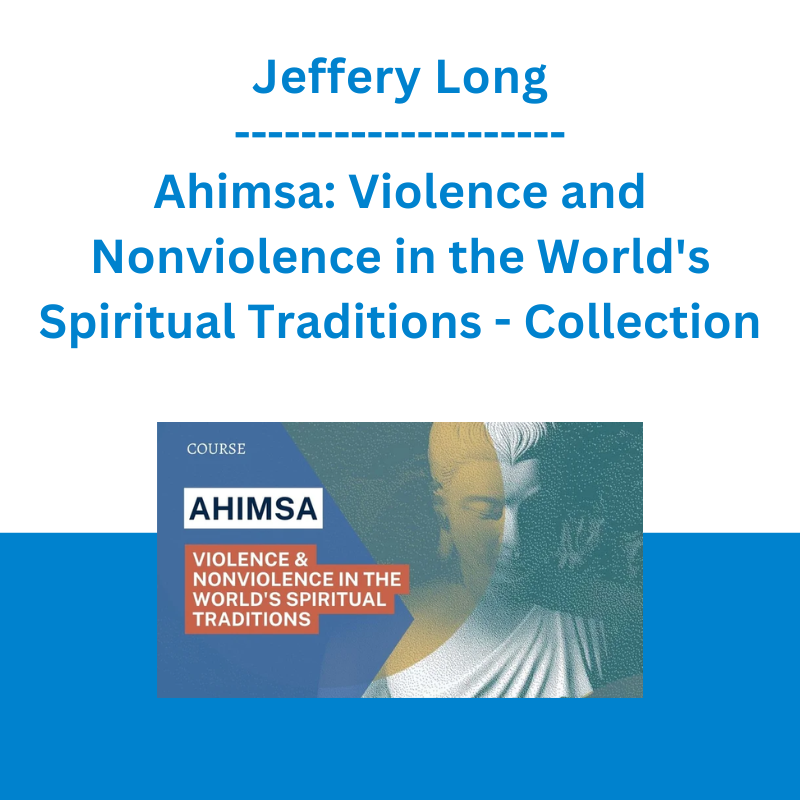*** Proof of Product ***
Exploring the Essential Features of “Jeffery Long – Ahimsa: Violence and Nonviolence in the World’s Spiritual Traditions – Collection”
Please see the full list of alternative group-buy courses available here: https://lunacourse.com/shop/About
What does it mean to practice non-violence in the world, and what do the world’s spiritual traditions have to say about it? What are the obstacles to living a non-violent life, and where do we draw the line between violence and non-violence?
This course will introduce students to the complex relationship between spirituality and nonviolence. We’ll explore contemporary and historical approaches to non-violence in the world’s major spiritual traditions and discuss some of the ethical challenges that arise when engaging the practice of non-violence. Our aim will be to answer the question of why traditions which affirm nonviolence as a central value so often become used as justifications for violence.
Module 1: Religion, Violence, and Nonviolence: An Overview of the Issues
Why do spiritual traditions which proclaim nonviolence as a central virtue so often end up being used as justifications for violence? What is the relationship between these traditions, violence, and nonviolence? Our first session will delve headfirst into this complex puzzle, focusing upon the dynamics of belief and identity and the ways in which these can lead to both violent and nonviolent behavior.
Module 2: Violence and Nonviolence in the Dharma Traditions
This session will explore the foundations of both violence and nonviolence as taught in the Dharma Traditions: the Hindu, Jain, Buddhist, and Sikh traditions.
Module 3: Violence and Nonviolence in the Abrahamic Religions
This session will explore the foundations of both violence and nonviolence as taught in the Abrahamic religions: Judaism, Christianity, and Islam.
Module 4: Looking Forward: Cultivating Global Nonviolence
This concluding session will pull together what we have learned in the preceding sessions about the complex relationships between beliefs, a sense of identity, violence, and nonviolence to reflect upon the possibility of and methods for cultivating global nonviolence.
Participants in this course will learn:
Contemporary theoretical approaches to the issue of religion and nonviolence.
The foundations of the practice of nonviolence in the Dharma Traditions (Hindu, Buddhist, Jain, and Sikh).
The foundations of the practice of nonviolence in the Abrahamic Traditions (Jewish, Christian, and Islamic).
The foundations of the practice of nonviolence in lesser-known traditions (indigenous traditions, Zoroastrianism, the Bahai Faith, and so on).
The story of various nonviolent movements rooted in spiritual visions of reality.
That many traditions extend the virtue of nonviolence to all living beings, and not only humans, with attentiveness to such aspects of life as diet and care for the environment.
Critical thinking skills, as the complex question of the relationship between religion, violence, and nonviolence is being explored.
Author
Jeffery Long
Jeffery D. Long is the Carl W. Zeigler Professor of Religion, Philosophy, and Asian Studies at Elizabethtown College, in Pennsylvania, where he has taught since receiving his doctoral degree from the University of Chicago Divinity School in the year 2000. He is the author of several books, including Hinduism in America: A Convergence of Worlds (2020) and Jainism: An Introduction (2009), the editor of Perspectives on Reincarnation: Hindu, Christian, and Scientific (2019) and the co-editor of Nonviolence in the World’s Religions: A Concise Introduction (2021) and Beacons of Dharma: Spiritual Exemplars for the Modern World (2019). Dr. Long also edits the series Explorations in Indic Traditions: Ethical, Philosophical, and Theological for Lexington Books. He has spoken on nonviolence at many prestigious venues, including three talks presented at the United Nations.










 Simpler Trading - Bruce Marshall - The Options Defense Course
Simpler Trading - Bruce Marshall - The Options Defense Course  Ed Ponsi - Forex Trading
Ed Ponsi - Forex Trading  Matan Feldman - The 13-Week Cash Flow Modeling - Wall Street Prep
Matan Feldman - The 13-Week Cash Flow Modeling - Wall Street Prep  Emanuele Bonanni - My Trading Way
Emanuele Bonanni - My Trading Way